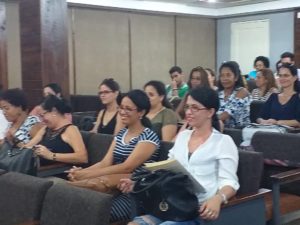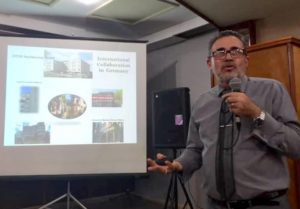June 18, 2019—Dr. Luis Velázquez, President of Cuba’s Academy of Sciences, called the course “extraordinarily important” for Cuban science and development in his inaugural lecture to the 52 health and related professionals at the National School of Public Health’s annual Scientific Writing Course. The two-week course, for which the School offers academic credit, also received collaboration from MEDICC Review and PAHO/WHO.
The 52 students plus 36 auditing the course—all overwhelmingly women—were chosen from 226 Cuban scientists who applied. The three earlier editions of the course have offered credit to 112 professionals from over 40 institutions and involved participants from every Cuban province.
Dr. Pastor Castell-Florit, School Director; Dr. Damián Vázquez, Editor-in-Chief of the Pan American Journal of Public Health; Dr. José Moya, Permanent PAHO/WHO Representative in Cuba; Dr. Lila Castellanos, Course Coordinator; and Gail Reed, Executive Editor of MEDICC Review attended the opening, as well as other guests and professors.

At the opening (l. to r.): Dr. Pastor Castell-Florit, Dr. Damián Vázquez, Gail Reed, Dr. José Moya, Dr. Lila Castellanos
The course includes lectures and interactive online sessions. Since participants are also required to have a manuscript in hand for submission to a peer-reviewed national or international journal, they also receive one-on-one tutorials from experienced editors. Three international experts—Dr. Vázquez, plus Dr. Paul Erwin (Dean, University of Alabama-Birmingham School of Public Health) and Dr. Helena Chapman (University of Florida)—join nine Cuban professors to offer their expertise and experience in scientific publications.
“This course is particularly important for Cuban and other Spanish-speaking health professionals,” said Ms. Reed, “since they may be on the front lines of medical and public health practice, innovation and efforts to expand equity. But their degree-granting programs do not usually contain sufficient training in scientific writing, and thus, their work is lost to the general scientific public and certainly to policymakers who could gain from their publications.”




